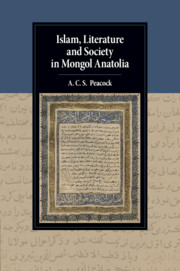Book contents
- Islam, Literature and Society in Mongol Anatolia
- Cambridge Studies in Islamic Civilization
- Islam, Literature and Society in Mongol Anatolia
- Copyright page
- Contents
- Illustrations
- Acknowledgements
- A Note on the Transliteration and Translation
- Abbreviations
- Introduction
- Part I Religion, Politics and Society
- Part II Literature and Religious Change
- 4 The Emergence of Literary Turkish
- 5 Vernacular Religious Literature
- 6 Apocalyptic Thought and the Political Elite
- Conclusion
- Bibliography
- Index
- Other Titles in the Series
- Plate Section (PDF Only)
4 - The Emergence of Literary Turkish
from Part II - Literature and Religious Change
Published online by Cambridge University Press: 07 October 2019
- Islam, Literature and Society in Mongol Anatolia
- Cambridge Studies in Islamic Civilization
- Islam, Literature and Society in Mongol Anatolia
- Copyright page
- Contents
- Illustrations
- Acknowledgements
- A Note on the Transliteration and Translation
- Abbreviations
- Introduction
- Part I Religion, Politics and Society
- Part II Literature and Religious Change
- 4 The Emergence of Literary Turkish
- 5 Vernacular Religious Literature
- 6 Apocalyptic Thought and the Political Elite
- Conclusion
- Bibliography
- Index
- Other Titles in the Series
- Plate Section (PDF Only)
Summary
This chapter considers the emergence of one of the main vehicles for the diffusion of new ideas of religiosity, literary Turkish. In contrast to previous studies which have claimed the emergence of Turkish as an expression of a proto-nationalism, this chapter argues that the emergence of Turkish must be seen against the twin background of the interest of Sufis, especially Jalal al-Din Rumi and his circle, in multi-lingual communication, and the new political circumstances thrown up by the Mongol invasions. Turkish is initially only used extensively for literary works in new cultural centres emerging in his period – the Mongol garrison town of Kırşehir, and the Turkmen principalities of the coastal peripheries. In the old Seljuq urban centres of Anatolia, Konya, Kayseri, Sivas, Persian remains the dominant if not the only form of literary language into the fifteenth century. Turkish thus seems to be a medium not just to communicate with an audience unversed in Persian, but an expression of political and religious aspirations.
- Type
- Chapter
- Information
- Islam, Literature and Society in Mongol Anatolia , pp. 147 - 187Publisher: Cambridge University PressPrint publication year: 2019
- 1
- Cited by

